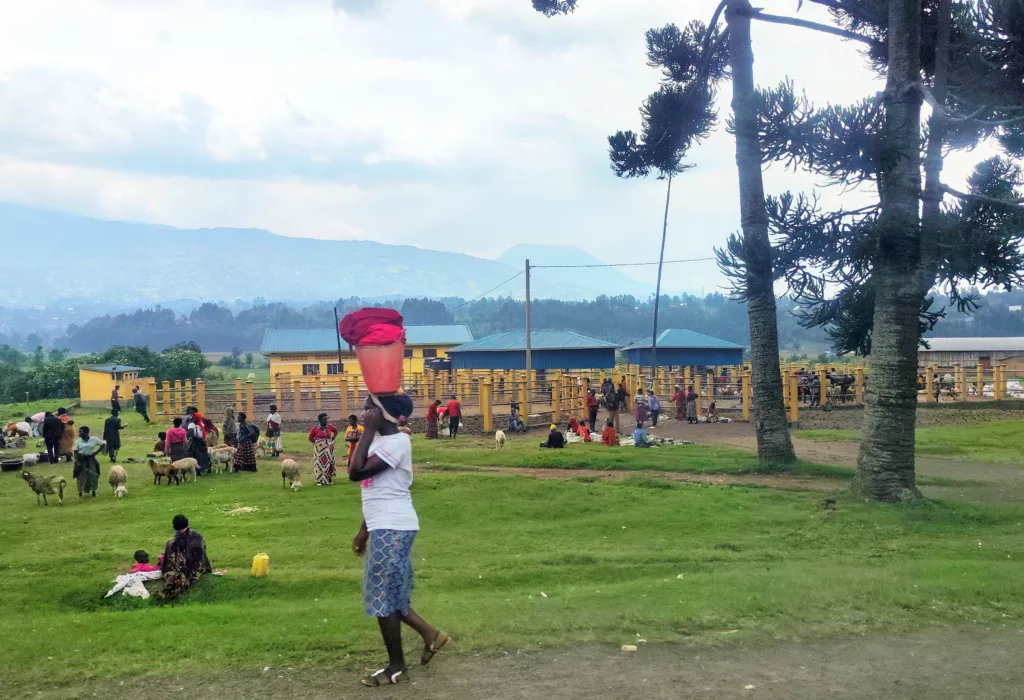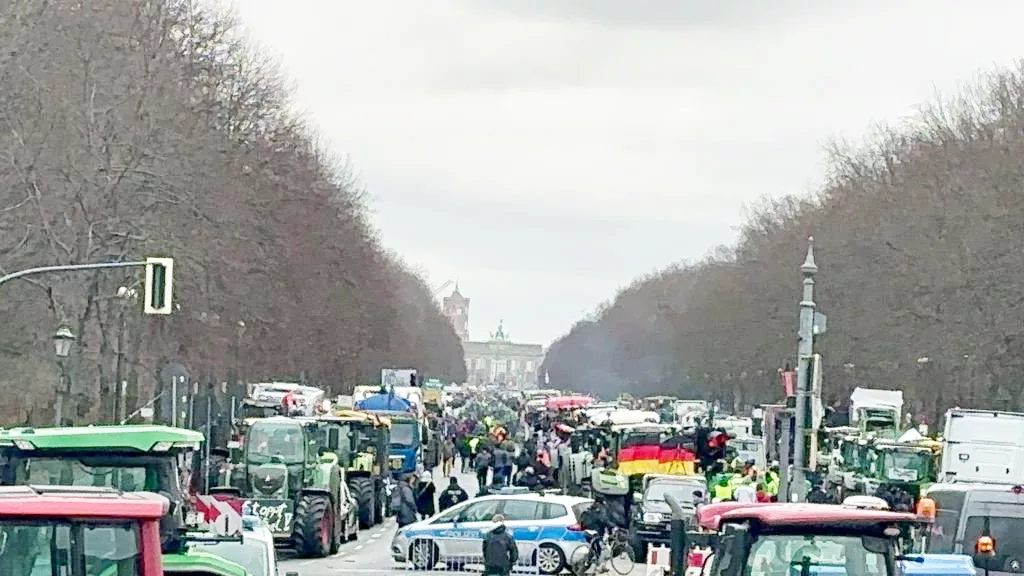
I understand the farmers, their protest, their anger. On January 26, 1990, during Green Week, I described the situation of farmers in the taz as it is today - 34 years later. The large amount of subsidies flows as export subsidies, into storage and into “price equalization” measures. Today, the farmer receives an average of 11 cents for an egg, 43 cents for a liter of milk (October 2023), and the farmer only receives one cent for each roll. Today, the farmer receives an average of just 22 cents per euro of consumer price. Things were different in the 70s: a whopping 50% of sales proceeds went to the producer.
The share of revenue depends heavily on the product, with 39% of the consumer price of dairy products going to the farmer, while for bread grain products it is just 3,9%.
Before I wrote this post, I spent a few years in Rwanda among small-scale farmers in the countryside. I remember how the government threw the Food and Agriculture Agency representative out of the country because he brought food into the country without authorization and thereby took away the market from small farmers. There was no hunger in Rwanda. The FAO, the Food and Agriculture Organization of the UN “helps ensure food security by developing” — and that’s just not what it does, it doesn’t help, it destroys in the interests of the big producing countries. Til today.
At the time, in the early 1990s, I worked in a committee of the Protestant Church that fought with all its might against the industrialization of agriculture and wanted to preserve rural agriculture - in vain. So much for the background of my post back then. What was lost in the reporting was that it wasn't just farmers on the streets, but also many craftsmen.
The seeds of subsidies

Millions of euros are pumped into agriculture every year in the European Community. Or better: into the agricultural industry. Because there can hardly be any question of sensible management of the land. WIELAND GIEBEL reports on the farmer's dung
The German teacher couple prefers to buy their farm in Ireland, Portugal or Greece. The farms die faster there. EC agricultural subsidies also reach there, but they do not promote farmers, but rather concentration. An agricultural job is lost every few minutes.
The dimension of the subsidy: Every year, each of the 320 million citizens of the European Community puts two hundred-mark notes in their bag for agricultural subsidies. This brought the total to 1988 billion DM in 64. That's 71 percent of the community's total budget, i.e. the largest chunk of Euro dough. For comparison: Individual plan 14, Defense of our Republic, amounted to 51 billion DM in the same year. Despite the billions spent, we get hormonal calves, smelly eggs from battery cages, and squishy pork on the table.
There is no doubt at all that organic, farm-based farming would solve all problems: food would be better and fresher, farming could be reversed and more jobs would be created. Constitutional protection in agriculture. This also serves mental hygiene, as we know that in a healthy body there is a healthy mind. After all, self-sufficient agriculture does not need feed from the Third World.
Europe's farmers are suffering. If farmers had any honor, they would suffer above all because of the dirt they produce. Nevertheless, farmers are among the losers of European agricultural policy.
There is absolutely no obvious reason why European agriculture should continue to produce in such a senseless manner. It is of no use to the large number of smaller farmers. While in 1950 they received 55 percent of each consumer brand in the Federal Republic, today (1990) it is only 20 percent. It is of no use to consumers. Life is being taken away from food and we are left with largely worthless food. It is of no use to the environment because the country is being depleted, our drinking water, at least from many waterworks, is only good for poisoning babies, but it does not meet the EC standard. The highly technical and chemical-intensive agricultural production method is the main cause of the rapid loss of species. It doesn't benefit the third world. Because of subsidized surplus exports and food aid, any attempt at domestic production in these countries is nipped in the bud as soon as it goes beyond pure subsistence.

Bread for the world, the sausage stays at home; Milk powder kills babies; Wheat extract flour instead of millet worsens the supply. Third world export crops, cash crops, rob the country for their own production, give people money and encourage alcoholism. If we changed our agricultural policy and eating habits, many farming families in Asia and Latin America would be spared from the multinationals' land-grabbing addiction and their children would be alive. Because: One animal calorie in the supermarket refrigerator consumes an average of seven plant-based calories.
There is nothing, absolutely nothing, to support this madness in agriculture. The products that we are offered to eat today make us sick and impotent and pimply anyway.
It is suggested to consumers that farmers benefit from the subsidies. Conversely, farmers are repeatedly accused of claiming that consumers are the beneficiaries of the low prices. Neither is true. Only a small number of large, industrially run companies have benefited from the subsidies, although the rural Daimler saturation rate paints a different picture. But 70 percent of the EC agricultural billions do not reach the farms. This was not calculated by the consumer associations, not by the conservationists and not by the “Association for Peasant Agriculture”, which are now merging, but by the European Court of Auditors:
• 34 percent of EC subsidies (1985) were spent on export refunds. Exporters and transport companies benefit.
• 22 percent of the subsidies were spent on warehousing. The money goes to the owners of cold storage facilities and warehouses.
• 39 percent of the subsidies were paid for price equalization measures, only a small portion of which went to producers. The food industry benefits, for example through cheaper butter and milk powder for the production of ice cream.
• In addition, 20 to 30 percent of all subsidy applications are fake. The EC Commission estimates the annual loss due to fraudulent transactions to be at least six billion DM.
• Actually, everything speaks in favor of stopping these profiteers and creating better nutritional conditions for the majority of the population, globally. The only argument against this is that she and her lobby in Brussels are extremely strong. They, the profiteers, are the chemical industry, the agricultural machinery industry, the banks, but also the food industry, the food wholesalers and the import and export companies. Another argument against this is that they are on the rise. The West won the Cold War, and we have not yet found appropriate ways to democratically control the industrial system that produces tremendous wealth and tremendous destruction at the same time.
We cannot come up with “preservation of creation” or similar nonsense at the moment. It has to pay off, from a business and economic point of view. From a business perspective, there doesn't seem to be any particular problem today. Sixty percent of the consumer food market goes to the processing industry and trade. Through producer-consumer communities, the share for farmers can be increased significantly. The elimination of chemicals further reduces the costs of the still inexhaustible market while increasing the workforce. If one sees the economy not exclusively as an increase in the gross national product, but also includes the social follow-up costs as undesirable, not only 64 billion DM could be saved, but also the costs for the remediation of water and soil.
Once upon a time, the farmer took the piss - today he mostly shits on Brussels.
And the consumer eats – the farmer’s worst crap.

